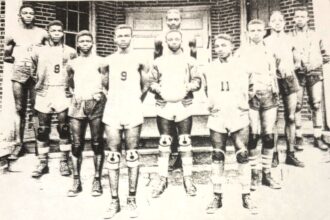I recently read a story about a young mother who bought an unused crib from a married couple on Craigslist.
The two ladies haggled back and forth on the price as most negotiations go when buying something listed online. The seller made her final offer firm, and ultimately the buyer ended up agreeing to pay what the seller wanted. It wasn’t the deal of a lifetime, but she could afford it.
Upon picking up her merchandise, she realized the crib belong to the couple’s infant son who passed away. The couple was selling a piece of their soul and battling a war inside that no one was aware of.
The young mother ended up sending the couple a card, and paid the full asking price of the crib. It wasn’t the object in question that had them hanging on, but the meaning behind that small piece of furniture.
We all have that one item in our life that it’s hard to part with. I’m a minimalist at heart and see no need to hang on to things that are torn, broken, or unused. I feel this way about most material possessions. We even donate clothing with tags on them that the children have outgrown or I’ve bought on impulse because it was a “good deal.”
Few things hold sentimental value to me except a few knick-knacks from a friend and a handful gifts from my family, but the one thing I can’t live without is an old potato masher.
To some, it may not look like much. It’s a piece of metal with a white handle and a plastic round disc on the end. It’s yellowed with age and certainly seen better days. I have a nice large one in the utensil crock beside my stove that I use often while the other one just sits untouched among various grill tools and thongs. Many times, I have opened the drawer where it resides and let a few angry slurs pass my lips as it catches onto things and leaves me shuffling through a menagerie of cutlery essential to food prep. Still, it remains in its rightful spot.
Often while preparing holiday meals, the sacred potato masher has been passed to my hand and left me barking orders to put it back. One would think I absolutely hated the thing, but I promise the story is the exact opposite. I truly do love it. It hasn’t touched a potato or the equivalent in years, but it’s mine and I’m purely satisfied to know that it exists.
You see, when my grandmother died, my mother and her siblings were left to shuffle through whatever leftovers remained after Mary Anne’s sisters had their turn. Gone were all the valuables she had saved for her children. In her final days, she knew she was losing her battle with cancer. She knew her time was limited.
Weeks before she took her dying breath, she gifted me a gold ring with a tiny diamond chip from her own finger. She had given instruction on what she wanted her daughters and grandchildren to have, but I feel as though she had a premonition that things would not work out as she had hoped.
I cried so much when Grandma died, I had no physical tears left to be shed at her funeral. I remember having these ugly dry-heaving sobs that wracked my little body, but nothing would come out. It was one of the most miserable moments of my life.
Weeks after her passing, as her dwelling was cleared of what remained of home goods and kitchenware, my mother grabbed that potato masher. For many years it took up residence in the house I grew up in. When Mama moved, it was packed up and toted to her new home. Years later while taking inventory for items for my own kitchen, the tool was finally gifted to me along with several plates that once belonged to my great grandmother Lucille.
I had strict instructions not to lose it or break it. Only a time or two did I attempt to use it. I found it wobbly and unstable, and I feared that it would snap in half to be rendered useless and broken. I pondered its fragile state and purchased another, more gangly masher to take its place. I couldn’t throw it away because it belonged to my eldest heroine, thus it now had its own zip code in my domain.
For me, it’s not just an ancient kitchen relic. It’s a memory of someone I could never part with.
Thessalonians 4:13-14
Brothers and sisters, we do not want you to be uninformed about those who sleep in death, so that you do not grieve like the rest of mankind, who have no hope. For we believe that Jesus died and rose again, and so we believe that God will bring with Jesus those who have fallen asleep in him.







